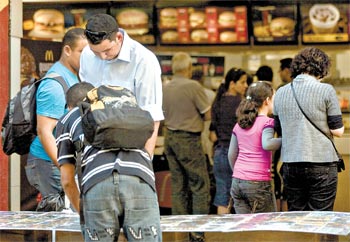Informal economy reaches R $ 578 billion
Source: Folha de Pernambuco (PE) - 22/07/2010

SÃO PAULO (Folhapress) - The growth of the Brazilian economy in recent years has contributed to the country reducing the level of production of goods and services in the informal sector. A study by the Getulio Vargas Foundation (FGV) commissioned by the Brazilian Institute of Ethics in Competition (Etco) showed that the movement of wealth not reported to the Government fell from 21% of the Gross Domestic Product (GDP), in 2003, to 18,4%, in 2009. This means that the underground economy moved R $ 578 billion in the last year. The figure represents a value close to the sum of all the wealth generated by Argentina in 2009. The term underground includes, in addition to informal workers, the movement generated with illegal activities, such as drug trafficking and smuggling. In 2003, the underground economy moved R $ 357 billion. In 2009 values, this would represent R $ 523 billion. According to the researchers, the absolute value registered in the last year is higher because the GDP base almost doubled in the period. Fernando de Holanda Barbosa Filho, responsible for the study, who is responsible for the study, avoids issuing an opinion on the size of the number, but reinforces that it serves as a basis for comparison with other countries. According to him, informality represents an average of 10% in countries of the Organization for Economic Cooperation and Development (OECD). Emerging countries have an average of 30% of GDP. According to Barbosa, the increase in the supply of credit was one of the biggest contributors to the reduction.
RELATED
Informal economy reaches R $ 578 billion
Author: Gabriel Baldocchi
Source: Folha de S. Paulo - 22/07/2010
Tax-free production and services account for 10% of GDP in rich countries and 30% in emerging economies
Rodrigo Capote / Folhapress

Commercialization of pirated DVDs in the central region of SP
The growth of the Brazilian economy in recent years has contributed to the country reducing the level of production of goods and services that operates in the informal sector.
A study by FGV (Fundação Getulio Vargas) commissioned by Etco (Brazilian Institute of Ethics in Competition) showed that the movement of wealth not reported to the government fell from 21% of GDP (Gross Domestic Product), in 2003, to 18,4% in 2009.
This means that the underground economy moved R $ 578 billion in the last year. The figure represents a value close to the sum of all the wealth generated by Argentina in 2009.
The term underground includes, in addition to informal workers, the movement generated by illegal activities, such as drug trafficking and smuggling.
In 2003, the underground economy moved R $ 357 billion. In 2009 values, this would represent R $ 523 billion. According to the researchers, the absolute value registered in the last year is higher because the GDP base almost doubled in the period.
The researcher at FGV (Brazilian Institute of Economics) at FGV Fernando de Holanda Barbosa Filho, responsible for the study, avoids expressing an opinion on the size of the number, but reinforces that it serves as a basis for comparison with other countries.
According to him, informality represents an average of 10% in OECD countries (Organization for Economic Cooperation and Development). Emerging countries have an average of 30% of GDP.
According to Barbosa, the increase in the supply of credit was one of the biggest contributors to the reduction. Companies and workers prefer to bear the costs of formalization in order to have access to financing rather than receive it more informally.
The growth of small companies and the increase in exporting companies required further formalization. The use of electronic banknotes and the modernization of tax collection systems also weighed in.
The researcher believes that the percentage of informal participation in GDP follows the growth forecasts for 2010 and maintains the downward trend, which may go to 18% of GDP.
"A great way out would be to reduce the tax burden and bureaucracy," suggests Barbosa.
The calculation for informal movements is made based on the demand for money and the number of informal workers, from PNAD (National Survey by Sample in the Home).
The result of 2009 was made with data from the previous year's PNAD, since the new survey only comes out in September.



